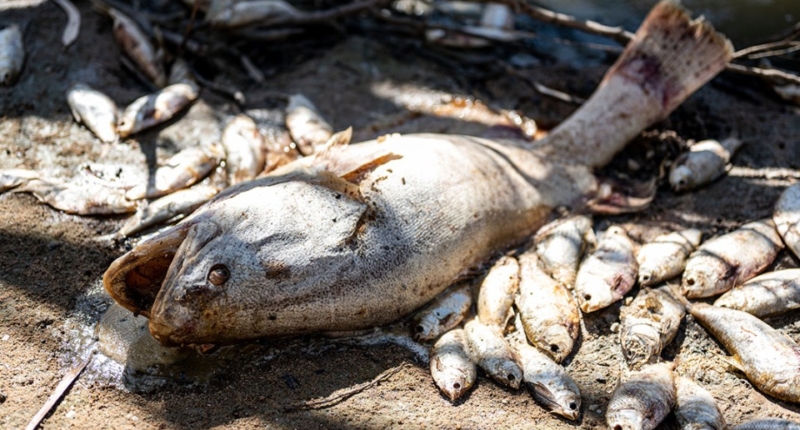Politicians are calling for immediate action to address the environmental threat posed by the millions of dead fish clogging the waterways of the Darling-Baaka River near Menindee. The NSW Department of Planning and Environment is closely monitoring the situation and keeping the community informed. The fish die-off is mostly composed of bony herring and was caused by recent floods and hot weather, leading to extremely low dissolved oxygen levels. Extreme temperatures this weekend are expected to exacerbate the situation, causing further fish die-offs. The stench of decaying fish is reportedly terrible, and locals are calling for immediate removal of the fish to prevent an ecological disaster. NSW Greens water spokeswoman Cate Faehrmann and federal opposition spokeswoman for water Perin Davey both stressed the urgency of the situation, with Senator Davey suggesting adapting aspects of the National Carp Control Program. Meanwhile, the Bureau of Meteorology is forecasting temperatures in the far west of NSW to reach 40 degrees Celsius this weekend, adding to concerns over the ongoing environmental crisis following the recent fish die-off near Menindee.
Urgent Action Needed on Menindee Mass Fish Deaths
Politicians are urging for immediate action to be taken to remove the millions of dead fish that have accumulated in the waterways of the lower Darling-Baaka River near Menindee, located in the far west of New South Wales. The mass fish kill-off is considered an environmental hazard and needs to be addressed urgently.
The NSW Department of Planning and Environment issued a statement on Saturday, indicating that they would continue to closely monitor the situation and keep the community informed. According to the statement, the fish die-off, primarily composed of bony herring, was triggered by recent floods and hot weather. As a result, extremely low dissolved oxygen levels were recorded in the river earlier this week.
This weekend’s extreme temperatures worsened the situation, which could result in more fish dying in the coming days. Locals report that the stench of the decaying fish is unbearable, with video footage shared on social media showcasing a thick layer of fish floating on the water. Additionally, some sections of the river have turned a bright shade of green.
Perin Davey, the federal opposition spokeswoman for water, believes that the national and NSW governments must find ways to dispose of the rotting fish as quickly as possible. Senator Davey recommends considering elements from the National Carp Control Program, which was established after six years of research into carp biocontrol strategies. She pointed out that dead fish were among the main concerns of the program.
According to the NSW Greens water spokeswoman, Cate Faehrmann, it is crucial to remove the fish as soon as possible before they decompose and cause an ecological disaster. Ms. Faehrmann stated that the fish need to be removed to avoid further degradation of the system and water quality. She added that the NSW and federal governments should collaborate to address the situation and clean up the fish.
The current mass fish death is too urgent to ignore. The NSW and federal governments must take urgent action to address the ecological threat and clean up the millions of rotting fish. Failure to act promptly could result in an ecological disaster, impacting the river’s natural ecosystem and communities relying on it for water.
NSW Braces for Heatwave Amid Fish Die-off Threat
The Bureau of Meteorology is predicting temperatures in the far west of New South Wales to hit 40 degrees Celsius this weekend, adding to the environmental crisis following the recent fish die-off near Menindee. In 2019, a 40-kilometre algal bloom in the same river led to the death of over a million fish. The event occurred during a period of high temperatures and drought along the river system’s length. This week’s fish die-off is expected to surpass the 2019 event.
Don’t miss interesting posts on Famousbio










